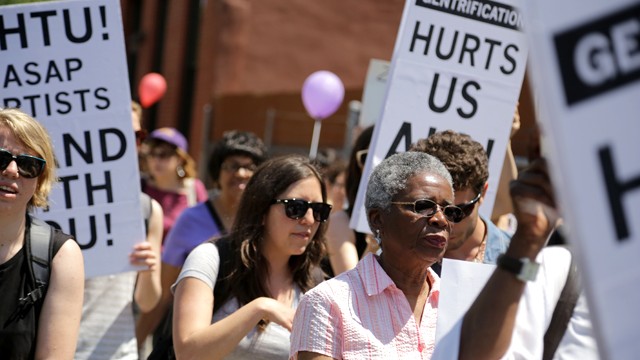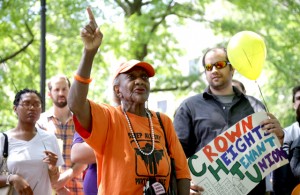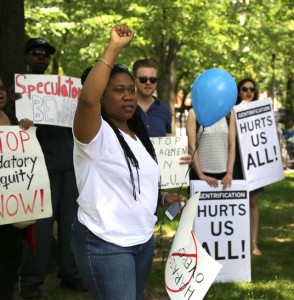
Next Monday, New York City’s Rent Guidelines Board will vote on a proposed rent freeze for the city’s roughly one million tenants who live in rent-stabilized buildings. The move, which was championed by Mayor Bill de Blasio during his election campaign, would be unprecedented in the 45-year history of the city’s Rent Guidelines Board.
It comes as the city faces a housing crunch that’s unlike anything in recent history. An April report by City Comptroller Scott Stringer found that between 2000 and 2012, median apartment rents rose by 75 percent — that’s compared to 44 percent for the rest of the US. Over the same period, New Yorkers saw their average incomes actually decrease after adjusting for inflation.
Advocates and some politicians — including Comptroller Stringer and Public Advocate Letita James — say a rent freeze could help New York remain affordable for low- and middle-income residents.
“Predatory equity”
A freeze would also put a damper on a trend that housing advocates call “predatory equity.”
With the cost of real estate climbing, the city’s market has become a good bet for speculators with private equity money. Increasingly, landlords in gentrifying neighborhoods are not a single individual or a family, but a large, faceless hedge fund seeking to turn a large profit on renters’ homes.
“In the years leading up to 2008, we had lots of private equity companies coming in and snapping up buildings from private individuals,” said Cea Weaver, an assistant director with the Urban Homesteading Assistance Board (UHAB), a tenant advocacy nonprofit. After the 2008 crash, New York, like the rest of the country, suffered a wave of foreclosures. But the city’s real-estate market rebounded faster than others. “We’re just sort of seeing a resurgence of the same sort of speculative prices for the first time in awhile,” Weaver said.
Speculators often pay far more for a building than its current tenants’ rents can support. “When a landlord speculates on a building, they’re basically making the assumption that they’re going to be able to rapidly raise rents,” said Weaver. UHAB studied one building in the Crown Heights section of Brooklyn, a rapidly gentrifying neighborhood, with over $5 million dollars in loans on it. Given what tenants pay in rent, UHAB calculated that the building could only support a loan of less than $2 million.
Each year, the Rent Guidelines Board sets how quickly landlords are able to raise rent. To release an apartment from rent regulation, a landlord must raise the rent to $2,500 a month. When a new tenant moves into a rent-regulated apartment and signs a lease for $2,500 or more, that apartment gets released from rent controls.
So the key to predatory equity is to push out long-term tenants who enjoy lower rents.
Organizing around a rent freeze
Vera Walker has lived in Crown Heights her entire life. She’ll be 87 next month.

Vera Walker, a long time resident of Crown Heights, at a Crown Heights Tenant Union rally. (Photo: John Light/BillMoyers.com)
When she was a child, it was a predominately white neighborhood, but in the 1960s and 1970s, the racial make-up shifted toward African- and Caribbean-Americans, with pockets of Hasidic Jewish communities. Walker’s community is now ground zero for gentrification — and for predatory real estate investments.
“I don’t have any problem with the people coming back,” she said. “But the poor people — the people that have been here, and supported the landlord, and were able to hold on to their property — they’re being pushed out.
“And even the so-called rich people that are coming in, they can’t afford the rents. They take a one-bedroom apartment, and in order to pay their rent, they have three or four or five people living in that one-bedroom apartment. That speaks volumes.”
At a tenant rally earlier this month, Keisha Jacobs, an organizer with the Crown Heights Tenant Union, described some the displacement strategies longstanding tenants are faced with every day: “The stack of small injustices; the clerical mistakes on your rent receipt; the administrative errors like cashing your rent check late; the miscommunication, repeated unreturned messages. They say they’re coming to finally fix your sink. You take a valuable day off only to have them never show up. Or the ceiling in your bathroom that’s coming down around your ears, but you see workmen fixing your new neighbors’ apartment because they pay twice as much as you do.
“These things are not just oversights. It’s not incompetence. It’s not mismanagement. This is not just a simple screw up. It’s systemic. It’s tactical. You are being targeted.”
In Crown Heights, a rent freeze has become a rallying cry for tenants old and new who want to unite against predatory landlords.
“I think it [gentrification] causes a lot of fear in people, and you think ‘what am I doing? How am I a part of this?'” said Celeste Hornbach, a member of the Crown Heights Tenant Union who moved to the neighborhood four years ago after graduating college. “So joining a tenant union with long-term tenants and fighting back together is one way I can feel like it’s not just me coming in and forcing them out, it’s making it about a bigger issue — that this is a structural problem, real estate, and it’s not us against them. We have to fight together.”
How a rent freeze could help
A rent freeze could shut down speculation.
“It’s telling the speculators, ‘you can buy this building if you want to, but you are not going to be able to raise the rents on it,'” said Weaver. “If you know, from the get-go, that you’re not going to be able to raise rents on a rent-regulated building, then why the hell would you speculate on it?”
Hornbach, of the Crown Heights Tenants Union, said she’s hopeful that with a new, progressive mayor and city council, New York is ready to tackle its housing crunch.
“It’s still something we have to organize around and rally against,” she said. “But I definitely feel like the moment is hot right now with the rent guidelines board vote coming up. And I hope we get the rent freeze.”
Update: The Rent Guidelines Board did not approve a rent freeze, instead opting for an historically low rent increase.
The Wall Street Journal reports “the board voted 5-4 to approve a 1% increase for one-year renewal leases beginning on or after Oct. 1. Tenants who opt for two-year leases could face up to a 2.75% increase. … Until Monday’s vote, the smallest increase the board approved since its inception in 1969 had been 2%, last adopted in 2012.”



